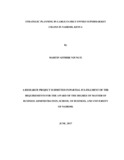| dc.description.abstract | This research aims to study strategic planning in large family owned supermarkets in Kenya. . The study seeks to answer the following research question; what is the state of strategic planning in large family owned supermarkets in Kenya? The study set out to assess strategic planning within large family owned supermarkets, and to establish the challenges in strategic planning within large family owned supermarkets in Kenya. The population of this study consisted of all large supermarkets that are family owned operating in Kenya. As at 30th, April, 2017 there were forty-five (45) supermarkets that were family owned operating within Nairobi (Retail Trade Association of Kenya, 2017). A questionnaire consisting of both open and closed ended questions were used. The questionnaire was organized into three (3) parts with part 1 capturing demographic data on the supermarket, Part 2 capturing data on the strategic planning practices and Part 3 Designed to collect data on the Challenges that strategic planners in these family owned businesses have to contend with. Analysis using SPSS was then be undertaken and the expected output was Descriptive statistics in this case the mean and standard deviation and Correlation Analysis to establish any relationships that may be inherent. The Pearson Moment Correlation (r) was derived to show the strength and nature of the relationship among variables. The number of branches a supermarket had had a negative correlation with political situation in the country, however it was not significant at either 0.05 or 0.01, but technical advances showed a negative correlation with the number of branches, and was significant at the 0.05 level. On the other hand, changes in social structure had a positive correlation with the number of branches a supermarket had at the 0.01 significance level. Due to limited resources, and time constraints, the study was not able to study a sample extracted from a population of supermarkets in the entire country, as such the researcher recommends that a follow up study may be undertaken with a broader population of supermarkets in Kenya, which can provide a higher level of confidence to extrapolation of the findings to the supermarket population in Kenya. | en_US |



